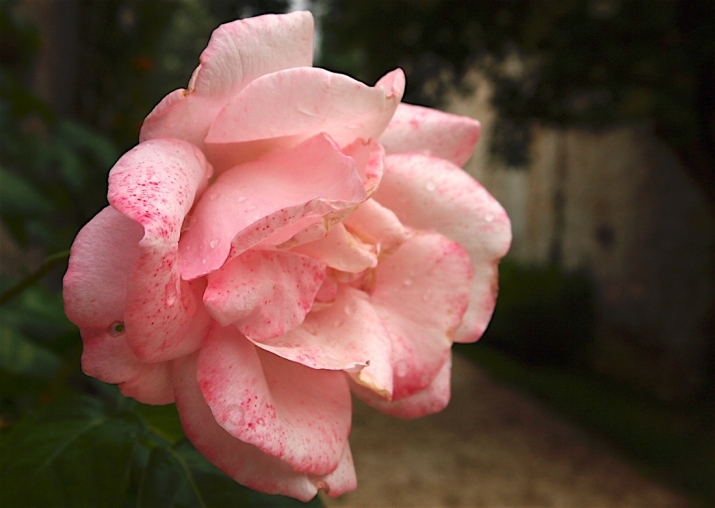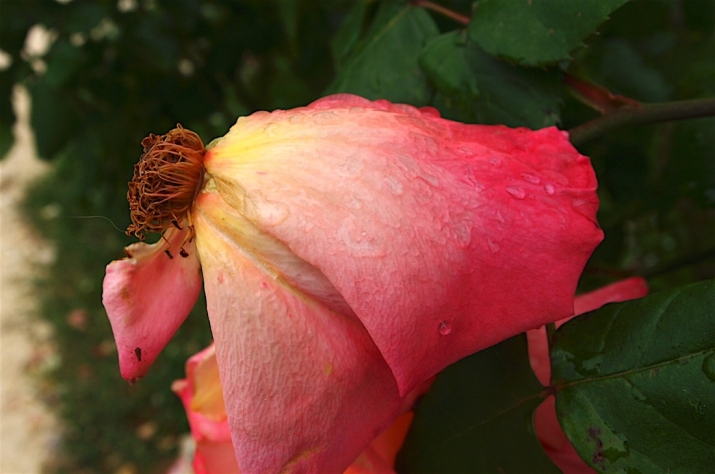FEATURES|COLUMNS|Mindful Living (inactive)
Intimacy, Humility, and Stillness: The Perfection of Wisdom
 Image courtesy of the author
Image courtesy of the author“To study the way of enlightenment is to study the self. To study the self is to forget the self. To forget the self is to be actualized by myriad things.” - Dogen*
The fourth of the ten paramis, or “perfections,” is panna, or “wisdom.” This is the wisdom of knowing things as they are. In the Buddha’s teachings, wisdom comes from understanding. But what are we meant to understand? In the Anuradha Sutta, the Buddha stated that, “The Tathagata has only spoken and taught in relation to one thing: suffering and the end of suffering” (Thich Nhat Hanh 2002, 282). This passage gives us clear direction as to what kind of wisdom to cultivate. Studying the canonical texts and commentaries can certainly play a role in understanding suffering (P. dukkha; also translated as “dissatisfaction” or “ill-being”), but studying alone does not equate to wisdom. The perfection of wisdom comes from understanding suffering and the end of suffering.
So, how do we understand suffering and the end of suffering? The answer is, by being present to suffering and its end. This is why the practice of mindfulness is the foundation of the Buddha’s path. Mindfulness teaches us to stop and to create the space needed to look and listen within. Inner stillness cultivates the soil in which wisdom grows. Sometimes, what we find in stillness is peaceful, even blissful. These experiences usually draw us into the practice, and when they arise, we may think that we’ve reached our goal. But these pleasant experiences are only part of the journey and are also impermanent. When we pay enough attention to the workings of the heart-mind, eventually the painful parts of ourselves that we have tried to keep hidden show themselves as well. It can then feel as if we’ve taken a wrong turn. We may even want to give up, but this is also part of the path and also impermanent. In order to understand suffering, and thus the end of suffering, we have to actually experience all the things that we want to avoid, forget, and transcend.
The cultivation of wisdom, therefore, requires that we recognize our ignorance and all of our negative mental formations. Fully recognizing one’s shadow, to use the Jungian term, is an important step toward acceptance and full awareness. Doing so, however, may feel horribly counterintuitive, so it’s important to simply recognize these states of mind and not get put off when fear, rage, and sorrow appear. Cultivating wisdom is not a simple matter of saying to oneself, “Be wise!” What often triggers the greatest learning is the moment that we feel the crushing weight of our ignorance and the searing pain of our sense of separation, which is the basis for all suffering. When the conditions are right, this can spark a fire of determination that moves us toward an understanding of the nature of life that is deeper than can be achieved by merely studying, praying, or meditating. As Dr. Martin Luther King said, “But I know, somehow, that only when it is dark enough, can you see the stars” (King 2015, 264).
Cultivating wisdom is like beginning a relationship. It’s intimate and tender. It is delightful and at times, also uncomfortable. To grow, we have to allow ourselves to be vulnerable. And like a relationship, we can’t do it alone. Wisdom does not arise in a vacuum. Our interactions with others are essential. If the wisdom we find in sitting meditation does not carry over into our daily interactions, it’s not wisdom. Other people aren’t what get in the way of wisdom and awakening. This is not to excuse those who attack, abuse, and oppress. Yes, traumatic experiences can be very difficult, but those who find resilience in the face of great challenge often become the wisest members of our communities. Painful encounters can motivate us to understand ourselves and each other. For wisdom to arise, we must also know the heartbreak of our own ignorance. To understand suffering and the end of suffering (liberation), we have to go beyond the dualistic thinking of “us” and “them.” Seeing things as they are means seeing the whole picture. Loving interactions are also essential to help us feel safe enough to listen to our deepest, inner wisdom. Again, we do not live in a vacuum. Simply put, panna needs our joy and our pain—our full experience, met with courage, tenderness, and clarity.
 Image courtesy of the author
Image courtesy of the authorAnother essential factor in cultivating wisdom is humility. The term comes from the Latin humus, or “ground.”** Humility, rather than denying one’s worth, simply means to be like the earth, not elevating one’s ideas and needs above everyone else’s. It takes great wisdom to be able to say, “I don’t know” and “I’m sorry, I was wrong.” No amount of certainty or intellectual knowledge can compare with the power of humility, which is free from pride and shame.
Humility is vital because wisdom does not guarantee that we will never hurt another. We will still carry biases and prejudice. The instinct for self-protection gets distorted into xenophobia, sexism, and economic exploitation. Wisdom allows us to see how we hurt others in order that we can apologize and learn from our mistakes. When we truly experience the interdependent nature of the universe, we understand that all suffering is interconnected and want to do all that we can to end it for all beings. We will also still get hurt, but will then work toward healing ourselves, eventually even being able to forgive because we know that people act unskillfully when they are in pain, even if that pain is not apparent. Wisdom also teaches us that we offer the gift of forgiveness first to ourselves, to free our hearts from the burden of resentment, anger, and fear. Understanding ourselves fully brings us into the lived experience that we are not separate beings, and so there is no difference between understanding the self, other, and all of life.
Existing only in interdependence, wisdom is innate and can never be found outside of our lives and our heart-minds. Ajahn Sucitto, the former abbot of Cittaviveka Monastery in the Forest Tradition of Ajahn Chah, writes, “Wisdom is an innate faculty, and it’s not just theoretical. It’s more like the discernment of a raccoon whose wise paws can distinguish between a rock and a clam in a stream.” He continues, “. . . mental awareness (citta) already has enough wisdom to recognize and resonate with qualities like kindness, generosity, truthfulness and integrity. We know what goodness feels like when it occurs; it is something that strikes us” (Ajahn Sucitto 2012, 65). Intellectual knowledge lives in the head, disconnected from the heart, disconnected from humanity and the flow of life. The intellect has an important role to play in discernment, but wisdom is far more vast and freeing. This wisdom is also called Buddha Nature. It is a whole-body knowing that even embraces uncertainty. This is why the Zen tradition emphasizes “Beginner’s Mind” and my teacher, the Venerable Thich Nhat Hanh, says simply, “Be still and know.”***
* Genjokoan - Actualizing the Fundamental Point
** http://www.oxforddictionaries.com/definition/english/humble
*** From the biblical passage, “Be still and know that I am God” (Psalm 46:10), adapted by Venerable Thich Nhat Hanh in teachings and calligraphy.
References
Ajahn Sucitto. 2012. Parami. Hertfordshire: Amaravati Publications.
King, Martin Luther. 2015. The Radical King. Edited by Cornell West. Boston: Beacon Press.
Thich Nhat Hanh. 2002. Chanting from the Heart. Berkeley: Parallax Press.














